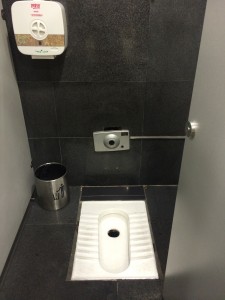Scott, Emma and I have been doomed to sit on airport public seating common for the past four hours; this must be what purgatory feels like. There’s only maybe two centimeters of “cushion,” or less hard plastic, on the seat of each chair; each square of this cushion is separated by a metal handle. Clearly this metal handle was installed to keep people from laying down and getting comfortable for very long. Well, the creator of this seating arrangement half accomplished that. Sleeping, although uncomfortable, is possible. With enough experience in the art of ambulance origami, I was able to at least lay down-ish. It wasn’t longer than ten minutes until my left arm fell asleep. I woke up enough to straighten it to improve circulation and take alway the pins and needles sensation; soon thereafter, sharp pain in my hip. I attempted to rearrange my legs enough to take some weight off my hip; unsuccessful. I check my phone, it’s 4 0’clock in the morning here, which really doesn’t mean anything to me yet. Time no longer exists when traveling such long distances; it’s merely a number, a number that is telling me that I have to wait until two full circulations before security will allow us through security. I should probably work on my first blog.
All three of us have draining nostrils. Emma fills her water bottle with Airborne and Scotts tells a story of how he thought he was supposed to eat the tablet. Little did he know he was supposed to dissolve it in the water. “I was about three-quarters of the way done chewing the tablet when I realized ‘this is not right.’” We had a good laugh. It gleefully broke up the monotony; Scott hesitantly allowed me to include that story in this blog.
The Baiyun Guangzhou International Airport slowly turns on the large overhead lights that illuminate the Depature Hall and our psuedo-home, the airport administrations thought 4 am would be the best time to do that. The volume in this giant structure swells as travelers scurry to check-in for their flights; it amazes me how many of these women are dressed and running in high-heels. I consider a night successful if I don’t fall nor do I take off my heels; traveling in high schools is another level of feminine success that I don’t expect to be able to accomplish. Some travelers opt to don surgical masks during their travel. I wonder if they realize that the surgical masks, although helpful while being sneezed upon or with any large droplet exposure, most of the worse kinds of airborne disease can penetrate right through that mask.
 The biggest adventure I’ve encountered during this layover is in the restrooms. Some of the stalls have Western-style toilets while the other stalls surround what is essentially a hole.
The biggest adventure I’ve encountered during this layover is in the restrooms. Some of the stalls have Western-style toilets while the other stalls surround what is essentially a hole.
Most of the Western-style toilets have been scuffed up with women’s shoes, clearly these women are standing on the toilet and squatting while urinating. Other women chose to avoid the toilet entirely and use the hole. I haven’t tried the hole yet. I may. I don’t think I have the technique to accomplish the job.
The flights themselves have been comfortable enough. I guess that’s what we get for choosing the cheapest flight to cross the world. It always seems like a good idea while booking and it always turns out to be a painful and regretful decision. We still have two more flights to take, one from Guangzhou, China to Manilla and the second from Manilla to Davao.
It’s an incredible feeling being able to do what we have the ability to do. Watching the virtual map show the location of our map close to countries like Russia, North Korea and Japan is like a dream. In school, we have to create papers and read novels about these countries; now we’re actually here. We are in a country that I’ve never dreamed of being in. I look forward to the next few flights being over with. After thirty hours, I just want to be in Davao. The first night in Davao will conclude with a team dinner and meeting. So, enough procrastination! Here is my blog:
It is no surprise that the more poverty, economic strain and danger that exists for women further decreases their ability to access quality healthcare. Gender and Conflict in Mindanao, written by Leslie Dwyer and Rufa Cagoco-Guiam at Mindanao State University, assess this issue and others acutely affecting the lives of women in Mindanao.
This conflict, fueled by religious and ethnic discrimination, has inadvertently increased the burden resting on women’s shoulder in Mindanao. At this time, men are no longer able to move freely in their villages in fear of threats of violence. This increases women’s mobility which, at first glance seems to improve women’s socioeconomic status, but actually forces them to be responsible for both male and female gender roles. Moreover, when violence erupts in Mindanao, all members of the family are restricted to their homes or, even worse, forced into IDP camps or to migrate into other parts of the country.
Being a government-registered internally displaced person (IDP), although allows for access to IDP camps, can also severely hinder women’s access to healthcare; furthermore, the camp itself becomes a harbor for the spread of disease, malnutrition and danger. “Diarrheal illness and pneumonia are the major causes of IDP deaths,” as written by Dwyer and Cagoco-Guiam. These two diseases, especially in young populations, are preventable and considering well over seventy percent of all IDPs are usually women and children, something can be done to stop these disease from spreading.
What is life like as a woman in an IDP camp?
What kind of algorithm or treatment plan exists for mass health issues for individuals and families living in rural Mindanao and in IDP camps?
What are living conditions like that allows for transmission of diseases? How fast are these diseases able to spread?
I look forward to being able to assess healthcare in Mindanao especially as it pertains to women.


